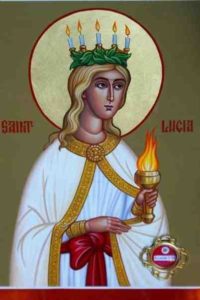Commemoration of Lucia, Martyr
December 13
The Lord be with you
 Another post-Biblical saint newly introduced to the liturgical calendar of the LC-MS with the introduction of the Lutheran Service Book is Lucia (Lucy) who was martyred around the year 304. Her memory was venerated at an early date, and her popularity spread across Europe and the Scandinavian countries.
Another post-Biblical saint newly introduced to the liturgical calendar of the LC-MS with the introduction of the Lutheran Service Book is Lucia (Lucy) who was martyred around the year 304. Her memory was venerated at an early date, and her popularity spread across Europe and the Scandinavian countries.
Her life, it is said, was one of purity and gentleness, and she was loved by the poor. Legends about her abound. When her mother was cured of a disease, one story reports, Lucy in gratitude to God gave all her bridal possessions to the Christian poor. Her disappointed suitor then reported her as a Christian to the prefect Paschasius, who condemned her to be arrested and taken to a brothel. When she would not cooperate in the activity of the place, they built a fire around her to frighten her into submission. She was finally killed by being stabbed in the neck, probably in the year 304 at Syracuse. Her body was taken to Venice; another supposed body of hers was taken to Corfinium in the eighth century and to Metz in 970.
Lucy is remembered with great affection by the people of Sicily and southern Italy. She is regarded as the patron saint of the laboring poor and, because her name means “light,” as a protector against diseases of the eye.
In medieval Europe, before the Gregorian reform of the calendar, St. Lucia’s day was the shortest day of the year, and the day was celebrated, especially in Scandinavia, as the turning point from the long nights. Swedish communities, including many in America, still have special festivities on this day, “Lussida’n.” In private homes one of the young girls of the household, dressed in white and wearing a crown of lighted candles, awakens the family in the morning and offers them coffee and cakes from a tray. For the rest of the day she is called “Lussi” instead of her own name. You can find many pictures of this on the internet.
Appropriate prayers include remembering those who walk in darkness, those who treat eye diseases, and those who struggle to resist the temptation of the world and its ways.
(Adapted from New Book of Festivals & Commemorations: A Proposed Common Calendar of Saints; Philip Pfatteicher)
Blessings in Christ,
Pastor John Rickert
